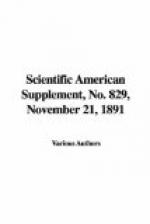SOME SIMPLE RULES.
The study of the physiological influence of the wave of low temperature, and of its relation to the wave of mortality, suggests a few rules, simple, and easily remembered.
1. Clothing is the first thing to attend to. To have the body, during variable weather, such as now obtains, well enveloped from head to foot in non-conducting substance is essential. Who neglects this precaution is guilty of a grievous error, and who helps the poor to clothe effectively does more for them than can readily be conceived without careful attention to the subject we have discussed.
2. In sitting-rooms and in bedrooms it is equally essential to maintain an equable temperature; a fire in a bedroom is of first value at this season. The fire sustains the external warmth, encourages ventilation, and gives health not less than comfort.
3. In going from a warm into a cold atmosphere, in breasting the wave of low temperature, no one can harm by starting forth thoroughly warm. But in returning from the cold into the warm the act should always be accomplished gradually. This important rule may readily be carried in mind by connecting it with the fact that the only safe mode of curing a frozen part is to rub it with ice, so as to restore the temperature slowly.
4. The wave of low temperature requires to be met by good, nutritious, warm food. Heat-forming foods, such as bread, sugar, butter, oatmeal porridge, and potatoes, are of special use now. It would be against science and instinct alike to omit such foods when the body requires heat.
5. It is an entire mistake to suppose that the wave of cold is neutralized in any sense by the use of alcoholics. When a glass of hot brandy and water warms the cold man, the credit belongs to the hot water, and any discredit that may follow to the brandy. So far from alcohol checking the cold in action, it goes with it, and therewith aids in arresting the motion of the heart in the living animal, because it reduces oxidation.
6. Excessive exercise of the body, and overwork either of body or of mind, should be avoided, especially during those seasons when a sudden fall of temperature is of frequent occurrence. For exhaustion, whether physical or mental, means loss of motion in the organism; and loss of motion is the same as loss of heat.
One further consideration, suggested by the subject of this paper, has reference to the bearing of the public toward the labors of the medical man in meeting the effects of the low wave of heat. The public, looking on the doctor as a sort of mystical high priest who ought to save, may often be dissatisfied with his work. Let the dissatisfied think of what is meant by saving when there is a sudden fall in the thermometer. Let them recall that it is not bronchitis as a cause of death, nor apoplexy, nor heart disease, as such, that the doctor is called




